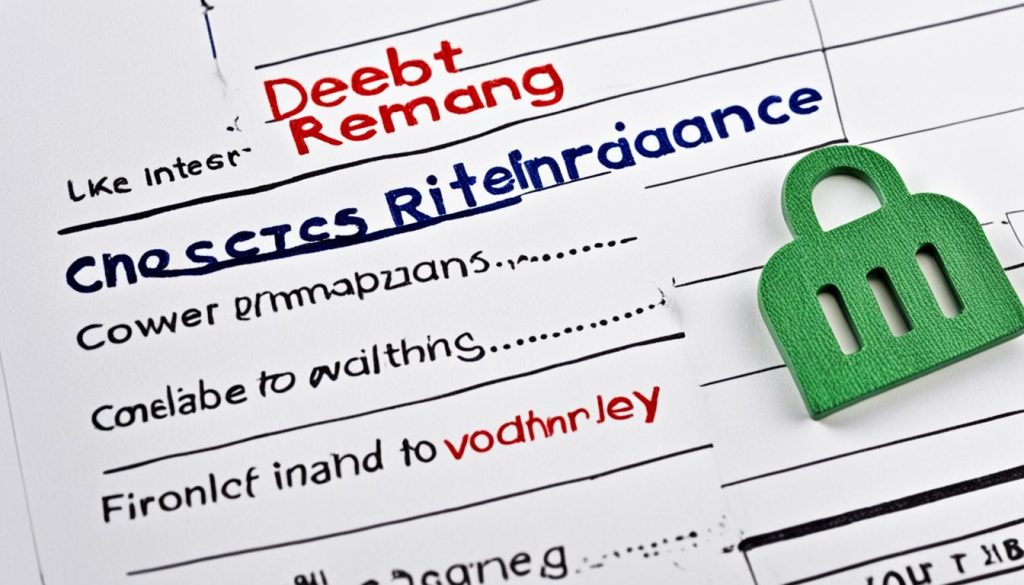As a homeowner, you might think about refinancing your mortgage to get better financial benefits. Refinancing can lead to lower interest rates, smaller monthly payments, and more cash flow. But, it’s key to know the risks before you start. This guide will cover the main benefits, strategies, and risks of refinancing. It aims to help you make smart choices and protect your financial future.
Refinancing can be a strong move in your financial plan, but it’s complex. Homeowners can save a lot by getting lower interest rates with refinancing1. Also, switching to a shorter loan can save you thousands in interest1. But, refinancing also has risks you need to watch out for.
Key Takeaways
- Mortgage refinancing can offer big financial benefits, like lower payments and interest rates.
- It’s important to know the risks, like closing costs, prepayment penalties, and how it affects your home equity.
- Timing your refinancing to get the best market conditions and interest rates can help you save more.
- Your credit score greatly affects the best refinancing terms and rates you can get.
- Thinking about the long-term effects of refinancing, like resetting your loan term, is key for a healthy financial plan.
Learning about the risks and pitfalls of refinancing helps you make confident decisions. This way, your refinancing plan will support your long-term financial goals and avoid surprises.
The Allure of Refinancing
Refinancing your mortgage can be a smart move, offering many benefits that can boost your finances2. With interest rates around 7%, refinancing could help you get a lower rate. This could lead to big savings over the loan’s life2.
Reduced Monthly Payments
One big plus of refinancing is the chance to lower your monthly payments2. A lower interest rate means you pay less each month. This could give you more money for other goals or needs2.
Lower Interest Rates
Refinancing lets you lock in a lower interest rate, thanks to better market conditions2. This can save you a lot of money over the loan’s life, possibly saving thousands2.
Improved Cash Flow
Refinancing can also boost your cash flow by tapping into your home’s equity2. This is great for paying off high-interest debts or financing home improvements that increase your property’s value2. Plus, if your mortgage balance is 78% of the original price and your loan is in good shape, you might drop private mortgage insurance (PMI). This can save you even more money2.
Deciding to refinance should depend on your financial goals and situation2. Whether you want to cut your monthly payments, lower your interest rate, or use your home’s equity, refinancing can be a key strategy for better finances2. Always talk to a mortgage expert to find the best plan for you2.
Unveiling the Potential Pitfalls
Refinancing can help with your finances, but it has its downsides. Refinancing comes with closing costs, like application and appraisal fees. These costs can reduce the savings you hope to gain3.
Refinancing can also extend how long you pay off your mortgage. This might not be good if you were almost done paying off your mortgage3. Some mortgages have prepayment penalties. These can make refinancing less beneficial3.
Closing Costs and Fees
Refinancing means paying closing costs and fees. These include application and appraisal fees. It’s key to look at loan estimates from lenders to know what these costs are4.
Resetting the Loan Term
Refinancing can reset your loan term. This might lower your monthly payments but can also mean paying more interest over time. Think about how the new term affects your finances and goals3.
Prepayment Penalties
Some mortgages have prepayment penalties. These stop you from paying off your loan early, which could cancel out refinancing savings. Make sure you know about these penalties before refinancing3.

Knowing these risks helps you decide if refinancing is right for you. Look at the costs, terms, and penalties to avoid problems. This way, refinancing can help you meet your financial goals3.
Navigating Interest Rate Risks
When interest rates change, it’s key to know how it affects your mortgage refinancing. Interest rate risks can change how much refinancing costs and if it’s a good idea. Homeowners should watch the market and plan their refinancing well5.
Understanding Rate Fluctuations
Interest rate changes can have big effects. For example, in 2007-2008, homeowners with adjustable-rate mortgages saw big refinancing risks when rates went up5. Things like prepayment penalties and losing home equity through cash-out refinancing made it harder for homeowners when rates changed5.
Timing the Market
- Keep an eye on market conditions and rate fluctuations to find the best times to refinance6.
- Know how the Federal Reserve’s decisions, like rate cuts, can affect your refinance timing6.
- Think about your financial situation and goals to pick the best time to refinance. Consider your loan terms, cash flow, and future plans7.
By understanding interest rate risks and planning your refinancing well, you can make the most of it and avoid problems567.

“Mitigating refinancing risk involves not counting on favorable conditions, planning ahead, and not taking on excessive debt.”
Refinancing and Your Credit Score
When you think about refinancing, know how it might change your credit score. Refinancing usually means a hard inquiry on your credit report, which can lower your score8. But, if you apply for several loans in a short time, like 14-45 days, it’s counted as one inquiry. This reduces the effect on your score8.
Also, think about how long you’ve had your credit. Closing an old account can lower your score, but not too much if it was closed well8. And, missing payments during the switch can hurt your score8.
On the bright side, combining several loans into one can help your credit score. It reduces the number of accounts with balances8. And, paying on time on the new loan can improve your score over time8.
For a smooth refinancing, check your credit report for errors9. Hard inquiries from refinancing stay on your report for up to 24 months9. Missing payments can hurt your score for up to seven years9.
Knowing how refinancing affects your credit score helps you protect your finances and use refinancing wisely10. The effects on your score can last a year, and inquiries can be seen for two years10.
| FICO Score Factor | Percentage of Total Score |
|---|---|
| Payment History | 35% |
| Amounts Owed | 30% |
| Length of Credit History | 15% |
| Credit Mix | 10% |
| New Credit | 10% |
The Impact on Home Equity
Refinancing can change how much equity you have in your home. Home equity is the value of your home minus what you owe on your mortgage. When you refinance, especially with cash-out refinancing, you can turn this equity into cash. This cash can help pay off debt, improve your home, or fund education11.
Cash-Out Refinancing
Cash-out refinancing might seem appealing, but it comes with risks. Taking cash out reduces your home’s equity. This could affect your financial health and your ability to grow wealth through your home11.
Equity Depletion Risks
Refinancing can lead to equity depletion. Closing costs and fees can use up your home’s equity. If property values drop, you might end up with less equity than before12. Think carefully about how refinancing might affect your equity, especially if you’re looking to cash out11.
To avoid losing equity, compare offers from different lenders. Understand the terms of the refinance deal and think about the long-term effects. This way, you can make a choice that fits your financial goals and keeps your equity safe for the future12.
| Metric | Value |
|---|---|
| Average American Homeowner’s Home Equity | $200,00011 |
| Average Home Equity Loan Interest Rate | 8.92%11 |
| Average Credit Card Interest Rate | Over 20%11 |
| Average Refinancing Closing Costs | $5,00012 |
| Maximum Cash-Out Percentage of Home Value | 70%12 |
“Refinancing with a cash-out option allows homeowners to access the equity they’ve built in their home and convert it to cash.”
Conclusion
Mortgage refinancing can help lower your monthly payments13 and cut down on the total interest you pay13. But, it’s important to know the risks and make smart choices for your financial future14. By looking at your finances, watching market trends, and getting advice from experts, you can make the most of this financial move.
Refinancing can simplify your finances, let you use your home’s equity, or change to a mortgage that fits your needs better13. But, think about the savings versus the costs and what it means for your future15. Avoiding common mistakes and making a smart choice can improve your financial flexibility and help you reach your homeownership goals.
Being thoughtful and proactive with refinancing can bring you financial stability and success13. Remember, your mortgage is a big financial step, and planning well is key to using refinancing to your advantage13. By staying informed and getting advice, you can confidently navigate refinancing and make choices that match your financial goals.
FAQ
What are the primary benefits of mortgage refinancing?
Refinancing can lead to lower interest rates, better loan terms, and more flexibility with your money.
How can refinancing help reduce my monthly payments?
Getting a lower interest rate through refinancing can save you money over time. This might also lower your monthly payments.
What potential risks should I be aware of when refinancing?
Refinancing comes with closing costs and can extend how long it takes to pay off the loan. It might also have penalties for paying off the loan early, which could cancel out the benefits.
How do interest rate fluctuations affect the viability of refinancing?
Changes in interest rates can greatly affect refinancing costs and its success. It’s important to watch the market and plan your refinancing to catch good rates.
How can refinancing impact my credit score?
Refinancing can briefly affect your credit score because it involves a credit check. But, keeping your credit in good shape can help lessen any score drops.
How can refinancing affect my home equity?
Refinancing, especially with a cash-out option, can reduce your home equity. This could have big financial effects in the future.

